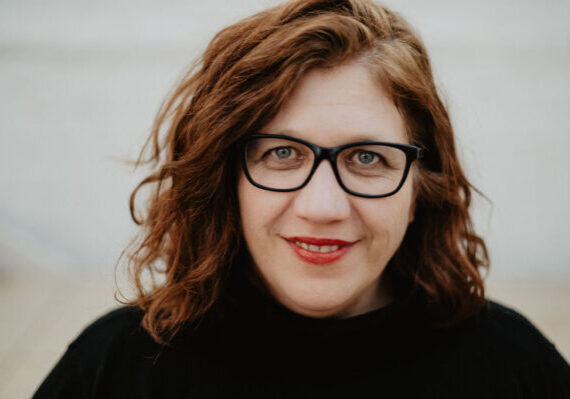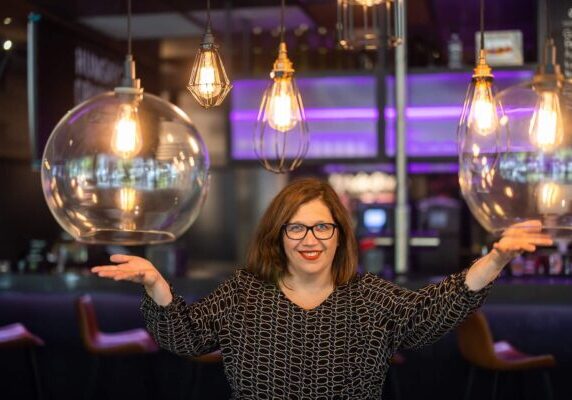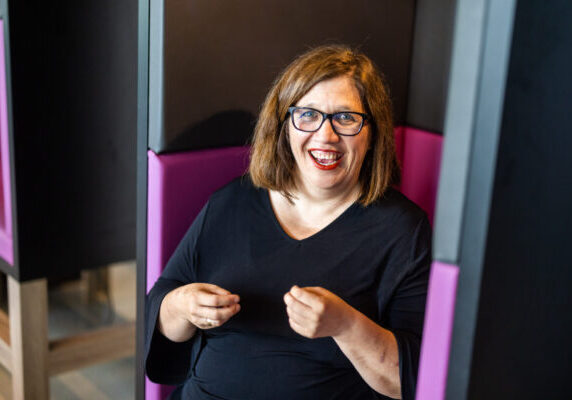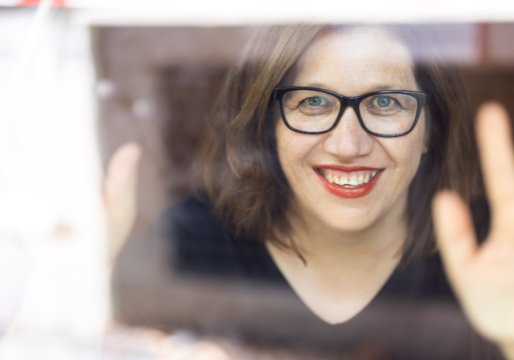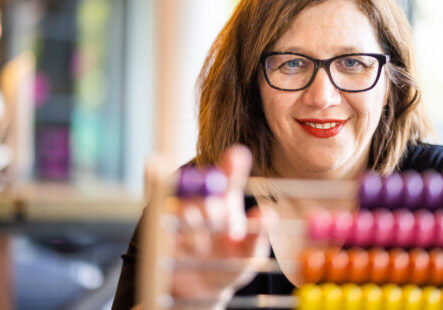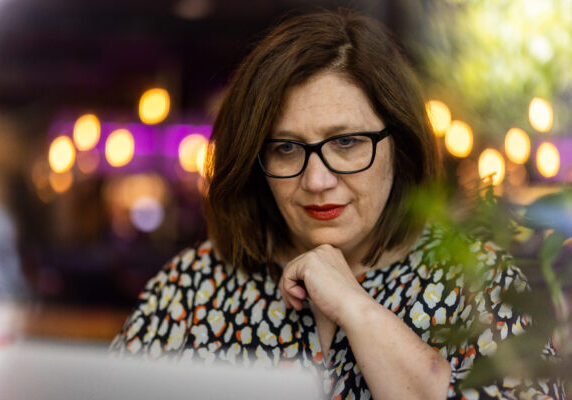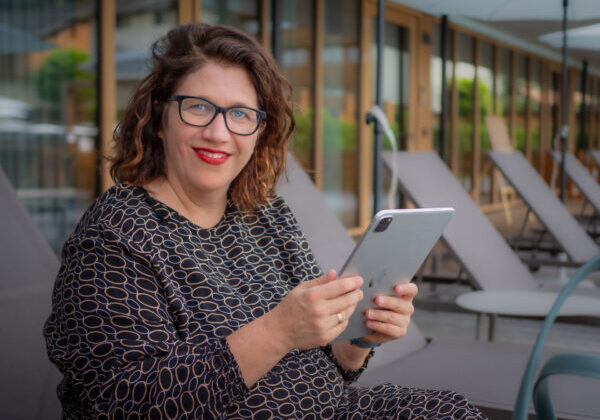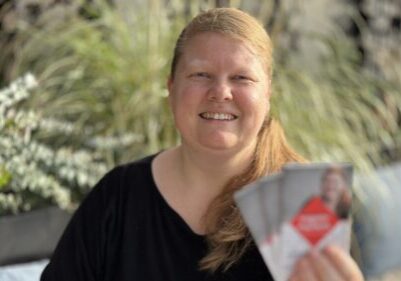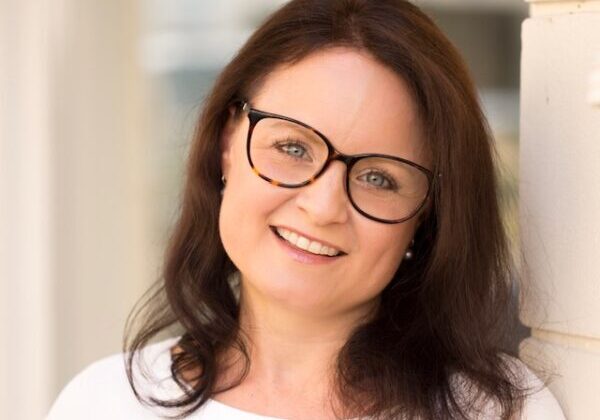Ein großer Name – eine tolle Frau: Leonie Dawson! Leonie ist einer der Gründe, warum es mein Business gibt und warum es so ist, wie es ist, denn sie war die, bei der ich ca. 2012 gesehen habe, dass es GEHT.
Sie generierte mittlerweile über 11 Mio. Dollar Umsatz mit 10 Stunden pro Woche für ihr Business. Und nein, sie ist noch keine 100 Jahre alt 😉
Sie betreibt ihr online Business mit verschiedenen Produkten und lässt ihre künstlerische Ader voll in diese einfließen.
Sie ist nicht mehr in Social Media unterwegs und arbeitet – statt wie ehemals einem Team von 25 Mitarbeitern – nun mit einer halbtags-VA.
Als Mutter betreute sie in dieser ganzen Zeit ihre Kinder selbst und ihr Ehemann kündigte kurz nach der Geburt des ersten seinen Job um bei der Familie zu sein.
Alles das begann mit einem: der Entscheidung diesen Weg zu gehen.
Ich freue mich sehr, Dich an diesem spannenden Gespräch mit diesem außergewöhlichen Rolemodel teilhaben lassen zu können. 🙂
Ich wünsche Dir viel Spaß damit!
Wenn du dir viel Zeit sparen und anhand kurzer knackiger Übungen für dich herausfinden willst, wo auf deiner Businessstufe die Meilensteine, Stolperfallen zu finden sind, lade Dir das kostenfreie Workbook herunter. Hier findest du auch Tipps, die Stolpersteine zu überwinden!
Klick hier für dein kostenfreies Workbook:
Die Roadmap für dein erfolgreiches online business
Blogbeitrag der Folge:
So hello, everybody. I have a very special guest today. I’m very happy to welcome Leonie Dawson today. Hi, Leonie, happy Tuesday.
Hi, Lena, thank you so much for having me and inviting me today. This is just such a joy.
Leonie, many people might know you, but in a nutshell, you are an author, an artist, a serial entrepreneur for many, many years. I think you’re blogging since 2004. Yes. You’re a mother of two lovely children. You are or have been a homeschooling mom, attachment parenting, mom.
And you build up your business and lead your business around 10 hours a week. And you made about $10 million with it right now.
Yeah, we brought in about $10 million in revenue since my business began, and it just keeps on growing. I think it’s just hit over $11 million now, which is just ridiculously exciting.
Which is great, and which makes you literally a role model. Have I forgotten something you want to add? And you shared with us over all this time that you are neuro diverse, that you are an introvert, that you had to deal with mental issues with, I don’t know the English word, hyperemesis gravidarum?
Yes. Yeah, yeah, that’s it.
I think it was. And I like to know you because I suffered with this myself in the pregnancy.
Oh, I’m so sorry. It’s just horrifying, isn’t it?
It is. It really is. And yeah, for me from the very first beginning, I think it has been 10 years now or something. It must have been 2012, 2011, when I learnt to know you. And it was from the very first thought that you were a role model for me, because there were nobody who did business as you did as a mom with two little children, homeschooling and all that stuff, and work as a business coach [crosstalk 00:02:57]
Who are not with her like a blazer and all that stuff.
And to combined everything you love, you are. And for you, was this clear from the very beginning that you would do all this, that you would show all of this?
Yeah, it was. I mean, I had no clue that it would go on to be as financially successful as it was. And that wasn’t my motivator. My motivator really was I wanted to have a creative career. I wanted to create the things that were inside me and whatever form that came, whether that was with artwork ,or bookays, or teaching.
And I knew that eventually I’d want to have kids and that that would be my biggest focus. I didn’t want to replicate a job into my own business, where I had to work 40 hours a week or more and have my kids in day care or whatever. It’s not something that I wanted to do personally.
It’s also when other people are like, yeah, that’s totally the right path for me. For me, it was like, no, I want to be there and spend as much time as I can with my kids. And so once they came along, my business was in the format it needed to be in. And it also really helped that my first baby was a challenging baby who didn’t sleep. And so I had very little time to work.
And so the business really had to be crafted in very tiny hours. So it’s 10 hours a week. And I needed to be the primary breadwinner for our family, because I’d asked my husband to retire from his job in order to be at home with us.
So it was just a matter of, this is what actually needs to happen. So it’s going to happen and I’m going to make it so. And I feel really grateful that it led me to where I am now.
Yeah, and it makes you very focussed from the beginning right now to be the breadwinner. So I have the challenging the little baby and everything. I thought you said, you asked your husband to retire. So this was an early decision?
Yeah, it’s been about 10 years since he’s been home with us, so pretty much as soon as we got pregnant, we started talking about how we wanted our life to lookay. And he works through until I think our baby was about three months old. And so I had maybe a couple of months of parenting by myself.
And I was like, I’m not a fan. I want to spend time with kids, but I don’t want to be the only one there because that’s going to drive me crazy.
Yeah.
Yeah, it was hugely intense. I wanted to be a present mom, but I think doing it on our own is a very unnatural thing.
Yes, I think so, too. And so it takes a lot, and so you did this decision. And how did you organise your business and your family from the start, because it has to be a big focus at least to earn the money a family needs, right?
Yeah. Yeah, I wasn’t necessarily very organised. I was just on the hunt to see when I could actually fit an hour in. And so even though I’m a morning person, I would probably prefer to have been able to create in the morning or whatever, that’s when my kid needed me the most.
And so it was when she would go down for a very short afternoon nap that I would be able to escape from her grips for an hour or so and run to the nearby park and work up a tree or whatever. And I guess the the organisation was just that focussed.
Like, okay, what is it I need to do today? I’ve got one hour, maybe two, if I’m lucky, before my husband calls me with the kid just screaming because he doesn’t have boobies. So what is it I need to do in order to make cash today? Like, cash, cash, cash, cash, cash.
And that extreme focus means that you have to let go of all the rest of the unimportant stuff. Even though businesses can be very busy, there’s actually a lot of stuff that you just kill off. You tardily can kill off so much stuff. Just do the bare essentials and just focus on a business model that’s going to enable you to scale your income without working more.
Yeah. So how did you find your business model or the things that bring in the cash from the very beginning?
For me, I’ve experimented with all different kinds of things. I’ve done one on one coaching. I’ve done retreats in person. I’ve sold stuff at markets. And what I ended up discovering was that when I started creating e-courses online, it was perfect, in that I could create something once, and it could go out and be sold to thousands of thousands and tens of thousands of people for years to come just from creating something once.
And the same with books. I’ve sold over a million dollars in workbooks now because I create goal planning workbooks each year. [inaudible 00:09:05]. I mean, books don’t have as much profit in them as e-courses, but they were really great entryway for people to begin working with you and then eventually invest in online programmes and stuff like that.
So, no, I don’t offer any one to fundraise. These people can work with me. Not that I don’t think that that’s a great business model, it’s just that this is totally my wheelhouse and it means I get to work much less.
Yeah. Yeah. Because it has to fit into the [crosstalk 00:09:43] if I was right.
Yeah, and I mean, you can absolutely charge very high prices so that [inaudible 00:09:49] the amount that you want to. But for me, it just through experimentation and offering one to one stuff. I just love creating programmes that can help tens of thousands of people.
Yeah, so I think it’s very much about what fits to you as a person to your clients, to your community, and to have at least a little bit scalable and all.
Yeah.
Yeah, and also what you did over this years were, I mean, once a hard decisions but strict decisions. So for example, you closed your academy after, I think, many years you did it, right?
Yeah, it was obviously nine years old [crosstalk 00:10:46].
You head, I think, a bigger team, and just hired it to go down from within five or ten people.
No, I had up to 25 people [crosstalk 00:11:02].
Oh, yeah, you did, yeah.
Yeah, and now I have one part timer [crosstalk 00:11:06] amazing.
Yes, so these are, let’s say, brave decisions at all. And how did you do this? How did you come to such decisions and say, okay, this is the way we are going now, this is the way I decide?
So with the team, it was more like, okay, I think my business was just growing so quickly, and I needed to either change my business model or outsource, and work with another company or number of companies. Or I needed to hire new staff. So I tried hiring new staff, and I tried what it was like to manage staff.
And it turns out I hate it. I really hate managing staff because I just don’t feel like I was born to manage people. I was born to come hide away in my little turquoise office and be left alone and make stuff.
And when I have to manage stuff, that really just messes me up. It just really infiltrates my brain space and doesn’t enable me to create and do the work that I want to do with the world. So it was really painful to go through that.
And it didn’t happen all at once. It went over a few years, in that when stuff would leave, or whatever. I just wouldn’t replace them just to see how it felt. And it was just through natural attrition. I had to fire couple of people for different reasons.
And eventually, I sculpted back into being where it needed to be again. And it feels really light and good and absolutely the right thing to do. And with the academy, there wasn’t anything particularly dramatic about it. Just that I’d been doing the same programme for nine years.
And I loved it. And I’d had people who renewed every single year for nine years and had an amazing retention rate. And it was still making gobs of money. I just felt like it was time for something new. And I wanted to honour the gift, when I had the idea for it so many years ago when I had a newborn baby, I felt like it was a gift from the angels, that idea.
And I felt like if I ignored that soul notch to close it, then I would be dishonouring that gift that had brought me so much abundance. So it was just time. Every circle must end. And then I went on to creating just individual programmes that people could could be involved with.
Yeah, so this sounds so simple, not easy, let’s say, in a way, because you look very much what feels right, what feels the right decision in the moment. And I think that’s a very, very good thing to do.
Yeah, and I’m still cautious. I still build-up other income streams to take to make sure that I could cope with the loss of closing my big programme. But I just feel like it’s important to follow those notches.
Yeah, because if you say it took some time or took some years, and I think sometimes it’s easier to build up something as a team than to build it down, to downsize it again. And in the end, as an employee, I think I had 10 employees. And to manage people is a job itself, right?
And so it takes a lot of time and as you say headspace and everything didn’t work for you. And what you also said is that to replace income streams as an employee in the beginning, and when you started the business and then when you decided to change business models. And with that, you also looked and tried what fits best or how did you deal with that?
Yeah, it’s really, I call it, playing. It’s an exploration. People always like, what’s the best business model for me? And I’m like, I don’t know, until you actually play and see what fits. I just feel like business is a constant experiment, really. And also what might feel right to you two years ago may no longer be the right fit.
So you actually just need to play, and explore, and experiment, and see what is right for you.
Yeah, entrepreneurship is,yes, a game.
Yeah.
And what you also did in the past was to share your experiences, as I said, about mental health, about hyperemesis. And in the academy or in the free stuff, you provided this to your community as well. So this was something you wanted to share what came out of your community as well, because they resonated with what you wrote, or how did this happen?
So I created the hyperemesis gravidarum that illustrated [inaudible 00:17:33]. I created it for me, because it was like a year after I’d had my second daughter. So it’s a year since I had hyperemesis, but I realised I was still holding on to a lot of the trauma and sadness of it, because it was just an enormously painful thing to go through.
And I remember a friend saying to me, you’ve talked about this a lot. It’s obviously something that’s big for you. Why don’t you do what you do with everything and turn it into art? And I love what Carrie Fisher says. She says, „You take your broken heart and you turn it into art.“
And so I made that over the space of a few days and cried lots. And it was enormously healing. And then, of course, I was like, right, I just want to just give this away and just offer it up. And so anyone who’s got hyperemesis can know that they’re not alone in it, because it can feel so deeply isolating.
And then for people who are going through hyperemesis, for them to understand the trauma of that situation and how best to support those people. So that felt really great. And I love that a lot of midwives and obstetricians will now stock it.
I’ve just print it free of charge, of course, I’m not charging anything for it. And I can give it away to their clients that are going through it as well. So that feels just joy enormously good and beautiful for me. And in terms of talking about my mental health stuff, it’s like, if you had a brokayen leg, you’d talk about your brokayen leg.
It’s exactly the same thing. When I look at my family tree, I come from really strong stuff that leaves for a really long time. They’ve got very strong bodies, but their mental health is fucked. And that’s okay. This is how genetics is, strong bodies, minds aren’t perfectly okay.
And so I’m really happy to talk about post-natal depression and having gone through a depressive episode as well. And I’m happy to talk about having a generalised anxiety disorder, because I’ve gone through this. I know that it’s totally normal and totally okay, and that so many people suffer from it.
So I might as well offer up my story and say, hey, this is what it was like for me.
Yeah, and because and all of this, you are a role model, too. And to care about all that stuff and the self care, at least the breadwinner, mother, let’s say, golden goose of the business. It’s so important.
And on the other hand, a lot of the mothers I work with, they struggle with being that visible and to share at least the personal stuff, because I think it makes you, let’s say, vulnerable in a way, too. I think you built up this strong community from the very beginning.
So was this ever a thing for you to they are. I’m not quite sure if I want to expose all this to be visible with all this.
So for me, it definitely has to be something once it’s done and I’m reconciled on some level. It’s really challenging to create about something when you’re still going through it. And I still writi’m while I’m going through stuff, of course.
But with those really vulnerable stories, it’s not like, I was live streaming, okay, I’m going to the doctor’s now, because I don’t know if I should be admitted, because I am very, very sad right now. It was more like, a few months had passed, and I was like, okay, I’m actually okay now. And I want to share what that experience was like.
And in terms of vulnerability, I’ve always found vulnerability is just an enormous gift. And it forms connections and people share the most beautiful and heartfelt stories with me. I don’t feel the need like, oh, I’m a business card. So I have to be professional. That doesn’t feel like fun to me.
I’d much prefer to just talk about what it’s like to be a human and connect with other humans. And I’ve had a little bit of negativity back, but it’s like one cranky letter of a thousand beautiful heartfelt letters. And I don’t know what the cranky letters life is like or who they are. I don’t give a shit about their opinions.
Probably it has to do more with them.
Exactly. It’s never got to do with me, because I don’t even know who I am. That [crosstalk 00:23:21] in person.
Yeah. Yeah, that’s true. And also, I think you started very early to step up. As I remember, I think you were one of the first people who wrote on social media, about, let’s say, when Donald Trump election, or Black Lives Matter, diversity, and all that stuff. So you also stepped up with these things.
Was this something that you say it’s important in a way to do so?
I think so. It depends on how important I think the issue, I think is, right? I’m not going to talk about every single Australian election, because currently, it’s not perfect, but democracy is maintained and all that stuff. And people know how I vote anyway in Australia.
But when it came to Trump, I just felt like this was before he got elected. I made it [crosstalk 00:24:56]. Do not vote for him. That is a very bad idea. Looking at the parallels between him, and Hitler, and the rise of white supremacy, and the fall of democracy, and all that stuff, I hope that my biggest fears were going to come true.
And not all of them did, but a lot of them did during his reign. Just to say, I feel like as somebody who has a platform, I have to talk about the things that I think are very important. And so I have to talk about racial justice and social justice issues. And I have to talk about the climate crisis and what I’m learning and how we can improve, really.
I think it’s a responsibility that comes with this beautiful gift of a job.
Yeah, yeah. So maybe one last question, I think. What were the biggest challenges you faced as a business owner with family over when you take it over all these years? What what is your best tip, let’s say, to deal with the challenges that come up for all of us?
Yeah, I think self care is critical. It’s the only way I’ve managed to keep on going this whole way. For me, that means every weekend afternoon, I have solo moment or retreats. So I let my children run wild and they can play Minecraft with their dad or whatever. I don’t care.
Just leave mommy alone. And that’s where I read in bed. I take e-courses. I do ad journaling and really just consciously fill my well. And I have my little daily habits checker of good habits that I want to incorporate, and make it a priority that I constantly feel well.
Because I’ve absolutely gotten to the point where I’ve depleted my well completely and run out of steam. And it doesn’t create good things for my family. It doesn’t create good things for my business. So whatever I could do to stop that, that’s great.
That’s great. Thank you so much, Leonie, for all sharing all of this with us. And so where can people find you? Because you quit on social media for business now?
Yeah, I don’t do social media and it’s been life changing. I am over at leoniedawson.com. I blog every day at the moment. You can sign up to get my daily-ish newsletters or my weekly-ish newsletters. And I constantly send free shit, and marketing advice, and life advice, business tips, money tips, book tips, book writing tips, and creating e-courses, and stuff like that.
So if you are into that stuff, you should absolutely be on my website. You should absolutely be on my newsletters. I’ve got 50 something thousand people who get my newsletters. And that’s been going for I think 17 years now, 16 years.
Well, great.It’s so amazing. In the end, I ask all my guests the, let’s say, the best tip or the most important thing you want to share with people or world, let’s say, what comes up right now?
I just want you to know that you don’t need to be anything but what you are, and that you were born for a really important reason. And you have big and bold gifts to share. And it’s not your job to judge yourself or second guess. Your job is to turn up and create and share what’s inside you. And that is how miracles are unleashed and that is how the world heals.
Thank you very much, Ms. Dawson.
Oh, thank you, Lena. Many blessings to you.
Thank you. Thank you. Bye.
Bye.
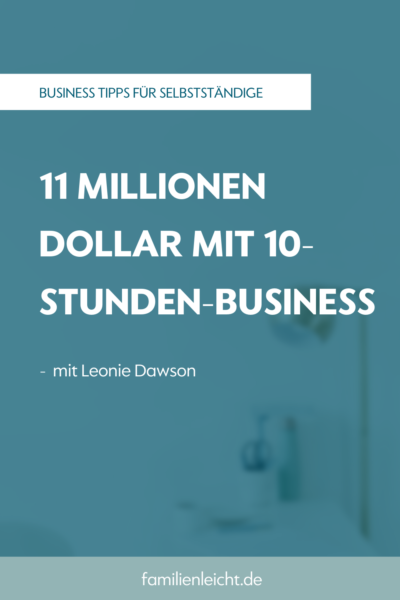
Weitere Artikel
Kategorien
Worüber möchtest du mehr lesen?
Familienleicht lernen, leben & arbeiten
Abonniere jetzt den Podcast
Life and business als bedürfnisorientierte Mama mit großen Ambitionen - hör rein und hol dir eine Riesenportion Inspiration ab, garniert mit Aha-Momenten und handfesten Tipps und Tricks zum ganzheitlichen Business-Auf- und Ausbau. Und lerne andere spannende Leute auf einem ähnlichen Weg kennen!

